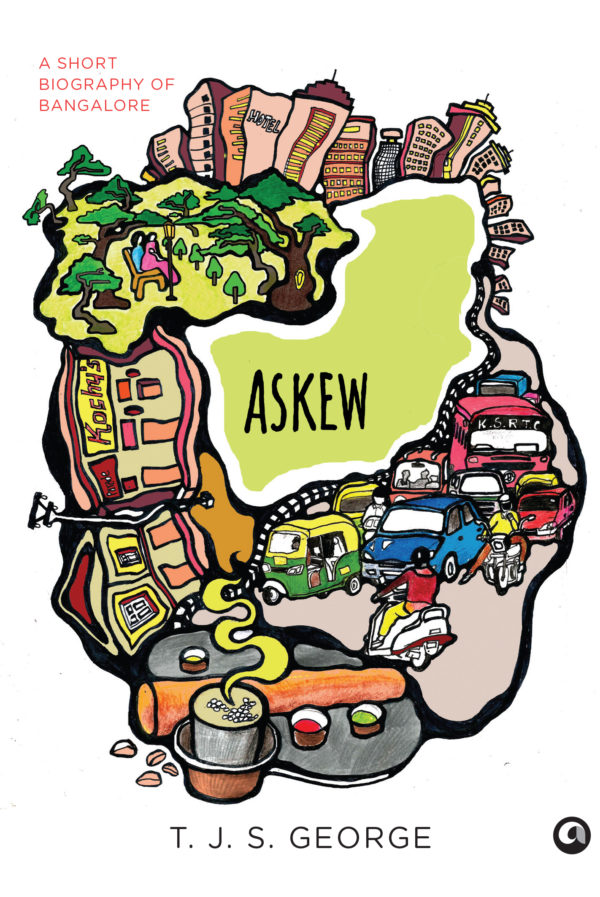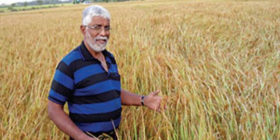“A city is a living, throbbing organism with a soul of its own and, it would often seem, a thinking mind,” TJS George writes in Askew, a delightful “short biography of Bangalore”, published by Aleph Book Company this month as part of its series of monographs on Indian cities.
Like all the volumes so far — on Delhi, Bombay, Madras, Calcutta and Patna respectively — this book is a combination of memoir, reportage and historical survey. Refreshingly, it is also written by “an outsider” to Bangalore, which, like many Indian metropolises, has not only changed its Anglicised name to recover its provincial glory, but also made a reputation, over the years, for being militantly hostile towards those who do not speak the local language, Kannada. In the recent months, the city has seen a spate of destruction and protests against the Cauvery water sharing agreement. Bangalore is also home to India’s worst traffic.
But as I enter George’s room at the Indian Express Building on Queens Road, the street noises dim, then fade away. A distinguished journalist with a long career, he sits at a simple desk, amid a comforting mess of books and papers. There’s no sign of a computer. He warns me he’s not much of a “speaker”. He never has been a fan of book launches — where he prefers to keep silent, he says — leaving the stage to others to debate and dissect his work. His writerly voice, on the other hand, is easy and engaging, graced by that rare gift only few storytellers have — the ability to hold the readers’ attention in thrall with each turn of the page.
Having moved to Bangalore from the national capital a few months ago, his book gave me a unique glimpse into the character of the city that no amount of traipsing around Indiranagar or MG Road would have, I tell George. And, in spite of the novelty of a new home, when I compare my arrival in Delhi from Calcutta, five years ago, with my moving to Bangalore recently, I feel the latter is more aloof towards newcomers. “You don’t have to apologise,” says George, “it’s true, Bangalore is more unwelcoming than it was when I came to live here almost 40 years ago.”
The reasons behind the city’s apathy to newcomers are not difficult to comprehend. Since the information technology revolution, it has rapidly grown into India’s premier IT hub, leading to overpopulation, unseemly pressure on civic resources and the public transport system, all of which George chronicles with insight and empathy. Understandably, local passions have been aroused against “outsiders” who came in and tarnished the image of the city that was once a pensioner’s paradise, with a green cover, lush neighbourhoods, close-knit communities and buildings that struck a balance between traditional and modern architectural styles.
“When the fabled founder of Bangalore, Kempe Gowda, set out to build his dream city in the early sixteenth century,” writes George, “his mother gave him two instructions: Keregalam kattu, marangalam nedu. Build lakes, plant trees.” In stark contrast now, most parts of Bangalore have turned into steel and concrete jungles. It’s once empty roads are chocked with traffic congestion that would give Beijing a run for its money; a large section of the city suffers from water crisis; and, over the last few years, incidents of atrocity towards people from India’s Northeast or from the African nations have been on the surge.
The irony of the situation, George says, is epitomised in the tussle between “rationalists and emotionalists”. The economy of Bangalore would collapse if non-Kannadigas were to be summarily driven out. It’s like the Shiv Sena trying to hound non-Maratha people out of Bombay. “Even though I don’t speak Kannada, I never felt rejected by Bangalore when I arrived here all those years ago,” he says. “But now, I feel, I’d have much more trouble for not being able to speak the language if, say, I’m stopped by the cops on the road.”
George, who lived in Hong Kong for 15 years, calls himself “a Bombay man”. He also spent some years in Delhi. But neither does he speak Cantonese nor is his Hindi much good. “My wife’s way of dealing with language problems is to speak in Malayalam with great confidence,” he says with a laugh. “Most people pretend to follow her or switch to a language both of them can understand.”
Not knowing Kannada was never a handicap to him, at least in the early days when he first arrived in the city to edit The New Indian Express, and was embraced by its community of journalists and intellectuals. “I knew two chief ministers — Ramakrishna Hegde and SM Krishna — quite well and UR Ananthamurthy was a friend,” he says. “But not for a moment I felt out of place for not being a Kannadiga.” He vehemently, but persuasively, disagrees with the latter on the decision to change the name of the city to Bengaluru — “I can’t even pronounce it,” George says, looking exasperated — and stubbornly sticks to Bangalore throughout the book and our conversation. (He explains his reasons in a crisp few sentences in an “Author’s Note” at the beginning of the book, which I won’t spoil by revealing.)
In spite of spending a bulk of his life in Bangalore, George hasn’t let his unsentimental view of the city get in the way of the reminiscences of old residents, who go back to a time when an air ticket from Bangalore to Bombay cost ₹285 and telephone numbers — landlines, of course — were four digits long. Decades go by, yet some things remain reassuringly the same. Or maybe they change just a little. On a visit to the iconic Vidyarthi Bhavan restaurant, for instance, George is told by a waiter, “But we have modernised, sir…. We have installed Reverse Osmosis plant and use RD purified water for cooking and serving.”
George hasn’t let his unsentimental view of the city get in the way of the reminiscences of old residents, who go back to a time when an air ticket from Bangalore to Bombay cost ₹285 and telephone numbers… were four digits long
While recreating the tender, but now nearly-lost, charm of neighbourhoods like Malleshwaram and Basavagudi (RK Narayan was said to have fused the two to create his idyllic Malgudi), George doesn’t lose sight of the nightmarish traffic snarls in parts like Whitefield, where children spend 3-4 hours commuting between home and school. Just as he speaks to NRIs who came back to settle down in Bangalore after the IT boom, he also brings in the voices of the champions of civic reform, like V Ravichandar and Arun Pai, into his narrative.
The most delicious chapters are, quite fittingly, devoted to the mushrooming of small eateries in Bangalore — a real source of joy and refreshing change (for me, at least), after the overpriced and overrated culinary scene in south Delhi. From stories about the advent of By 2 Coffee, MTR, the menu at Airlines Hotel or Cafe Darshini to anecdotes about a famous array of gangsters (Agni Sridhar), politicians (Devaraj Urs) and editors (YN Krishnamurthy, known to most as YNK), every page regales the reader with something rich and quaint.
The metaphors for contemporary Bangalore, George writes in perhaps the most evocative passages in the book, are the inheritors of two of the biggest business empires in the city — Rohan Murthy of Infosys and Sid Mallya of the UB Group. Looking at their respective careers, fraught with arrivals and departures (in Murthy’s case, he seems to have finally returned to live in the city), he detects a pattern that captures at once the intensely family-oriented life of Bangalore as well as its relative transience, where professionals come and go with “fashionable rootlessness”.
While firmly rooted to the everyday, physical realities that plague the life of a city, George is also able to elevate his pitch to a metaphysical level every so often, but without being ostentatious or abstruse about it. It is this ability to make the reader experience the materiality as well as the mystic qualities of a place that makes his book so special.
In a particularly penetrating passage George writes, “It is perhaps woven into the texture of the human mind to build and enjoy, then to overbuild and suffer, then to collapse and complain, and then to become argumentative about what happened,” as he goes on to ruminate on the fate of modern metropolises. Bangalore’s destiny could not have been summarised any better.






Leave a reply